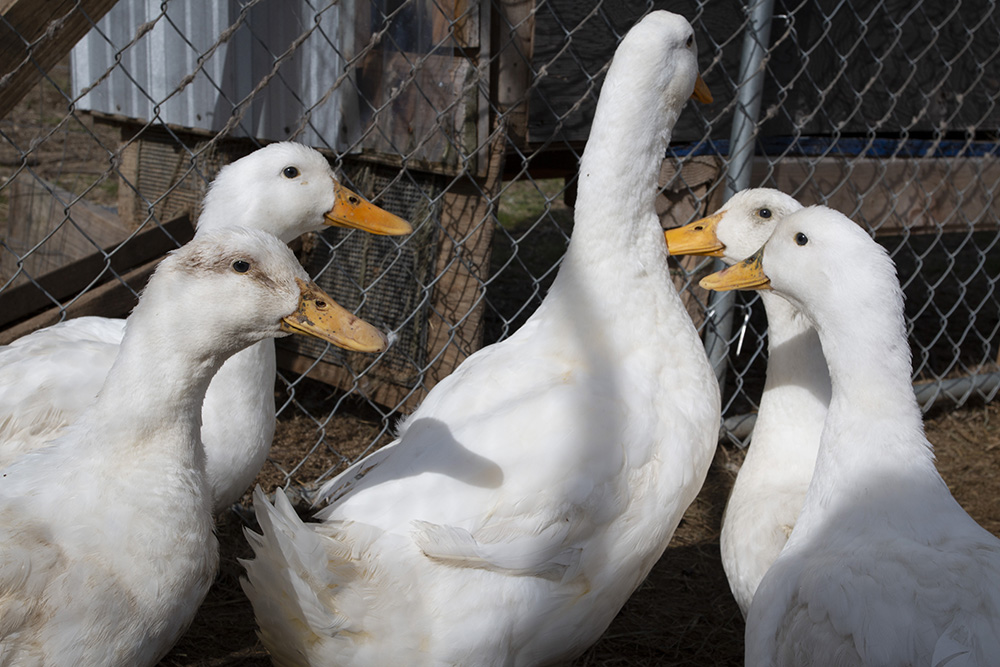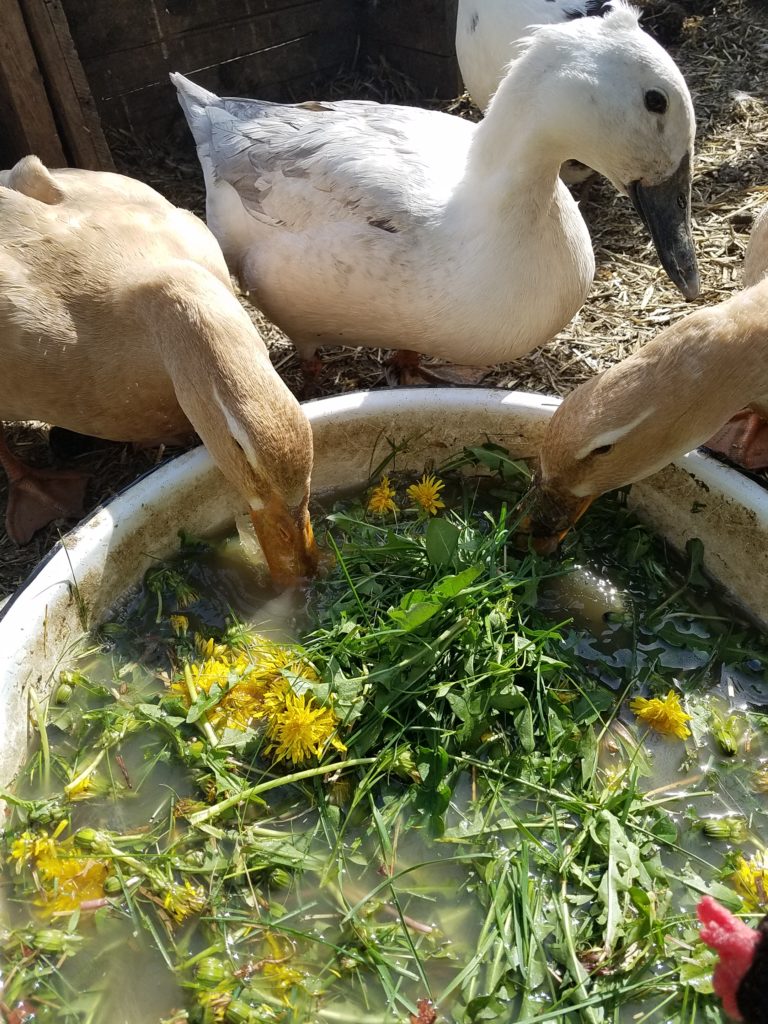What do ducks eat?

In the world of backyard poultry, ducks hold a special place in many people’s hearts. They produce rich, flavorful eggs and are — mostly — known for their charming personalities. Ducks are hardy by nature, and will harmlessly mingle with other farm animals. But to keep them healthy, it’s important to feed them a good diet, one that sometimes differs from their frequent companion, backyard chickens.
“They’re healthy eaters,” said Lisa Steele, author of the book Duck Eggs Daily: Raising Healthy Happy Ducks Naturally. Steele raises ducks and chickens on her farm in Maine. “They just really want to eat worms, lettuce, greens, stuff like that.”
This may come as a surprise to people who grew up feeding bits of bread and crackers to ducks at the park. And indeed, ducks will eat bread, but it’s not actually good for them. In fact, in recent years, multiple wildlife organizations and educational publications have urged people to stop feeding ducks processed food, which fills the birds’ stomachs without providing any of the nutrients they need.
“Ducks aren’t designed to consume processed bread,” said Gavin Hitchener, veterinarian and a boarded veterinary anatomic pathologist at Cornell University Duck Research Laboratory. “There are numerous problems with it.”
Domestic ducks, similarly, require simple, nutrient-rich food to remain healthy. But that doesn’t mean you can’t have a little fun with it.
What to feed ducks on a daily basis
As the basis for a domestic duck’s diet, farmers often use a commercial feed that is specifically formulated for waterfowl. This is often in the form of pellets, but ducks will also consume it as a fine mash, according to CJ Walton, owner of Black Duck Farm in Becket, Mass.
Walton raises rare and heritage duck breeds and sells their eggs to restaurants and grocers in their area. There are quite a few options for waterfowl feed, he said, but he prefers a custom feed mix that he purchases from Stone House Grain in Hudson, N.Y.
“We’ve found that the ducks need the mash to be pretty fine,” Walton said. “They’re not going to eat whole corn. Everything needs to be pretty cracked or ground.”
For those with less access to waterfowl feed, a popular alternative to waterfowl feed is chicken feed.
“It’s actually really hard to find duck or waterfowl feed,” said Steele, who owns a wide variety of ducks and chickens. “The easiest thing to do [if you have chickens] is to feed everyone chicken feed.”
To make the chicken feed more duck friendly, Steele adds brewer’s yeast, which contains niacin, a form of vitamin B3 that ducks need for healthy development. The vitamin also aids in digestion, promotes healthy bones and supports the immune system. It can naturally be found in yeast, meat, eggs, green vegetables and cereal grains.
Steele also adds rolled oats to her chicken feed to cut the protein. She’s found that providing ducks with too much protein can cause them to grow too fast and become too heavy, which adds stress to their legs.
These additions to the chicken feed are healthy for chickens, too, Steele said.
Always provide ducks with water
Water is important to ducks — and not just for swimming.
“Ducks always need access to water when they eat,” Walton said. “They have trouble swallowing if they don’t.”
Walton said that he’s heard of first-time duck owners not knowing to provide their ducks with water, and their ducks choking on their food as a result.
Special duckling food is key
Providing ducks with proper nutrition during their first few weeks of life is paramount to proper development and sustaining health in the future. This isn’t difficult to do, but it does require a little bit of knowledge about what a duckling needs.
Most farmers start out feeding ducklings with commercial chick starter, which is formulated to promote healthy development in chicks. However, as Steele noted, ducks need niacin — and this is important for ducklings as well so the feed needs supplementing. Chicks don’t require this nutrient.
“In the wild, ducks are able to get large amounts of niacin, which they need for leg development,” said Walton. “And no chicken or chick feed has enough niacin for ducks.”
To solve this problem, Walton said you can blend brewer’s yeast into the chick starter, or you can add a niacin supplement to their water.
“When we’ve bought ducks a few weeks old from other farms or sometimes people give us ducks, if they haven’t been on niacin, we usually notice some leg issues,” Walton said.
In addition, Steele suggests keeping an eye on duckling weight and pulling them off chick starter fairly early in life to prevent them from growing too quickly. She usually feeds chicks on chick starter for about eight weeks. In contrast, she feeds her ducklings chick starter for only two weeks before switching to an adult chicken feed mix.
But each farmer does things differently. Walton starts his ducklings with a chick starter feed that is 20 percent protein, then takes incremental steps down in protein percentage until he’s at about 17 percent protein when the ducks are 18 weeks old. He then swaps them to chicken layer feed.
Watch your duck’s weight
In general, ducks easily put on weight. This is great for people who raise ducks for their meat, but it can also cause health problems. This is especially important to keep in mind when raising ducklings, which grow rapidly.
“[If they grow too fast], their legs give out,” said Hitchener. “They aren’t designed to carry that kind of weight and it puts a lot of pressure on their joints.”
Hitchener said that in some cases, you may need to restrict their feed. You can also provide them with less protein, offering them leafy greens instead. Providing plenty of space to roam and swim can also help keep ducks at a healthy weight.
Calcium and grit is important
Sometimes ducks may need a supplemental calcium source. Walton provides this in the form of ground oyster shells. It’s also important to note that certain commercial waterfowl and chicken feeds contain more calcium than others.
“Thin-shelled eggs are usually a sign of them not getting the calcium they need,” Walton said.
In addition, ducks should always have access to grit, which helps them digest their food. Ducks don’t have teeth, so they use grit (sand or small stones) in their digestive tract to help them break down larger food items, according to a fact sheet on duck digestion published by Ducks Unlimited, the world’s largest waterfowl conservation organization.
Let them forage and graze

Allowing your ducks to roam over a pasture or swim in a pond can provide them with natural food that will boost their health. Furthermore, allowing ducks to free range will save you money on commercial feed.
“They tend to like broad leaf grasses, like dandelions and clover, so I put down a pasture mix that’s pretty heavy in those,” Walton said. “I’d say pasturing the ducks cuts down their grain consumption by about a third.”
Walton prefer to rotate his ducks between pastures throughout the summer to prevent their water area from becoming a soupy mess.
“They’re a lot easier on landscaping and gardens than chickens,” Steele said. “They don’t really ruin stuff, but they will trample smaller plants and nibble on bottom leaves.”
In addition to foraging for greens, ducks snatch up slugs, worms and a variety of insects. And if they’ve access to a pond, their diet may also include fish, algae and small aquatic animals.
Treats that are OK for ducks
For treats or supplemental food, ducks enjoy a wide variety of plants and insects, Steele said, and these “healthy foods” provide the nutrients that the birds need to maintain good health.
“They love leafy greens,” Steele said. “I grow tons of stuff in the summer for them — Swiss chard, kale, broccoli, Brussels sprouts.”
In addition, she frequently feeds her ducks watermelon, cucumber, berries, peanuts, peas and corn. Some of these snacks — such as peas and corn — float, so ducks can eat them while swimming or drinking out of a water bowl.
Walton also feeds his ducks a variety of garden goods.
“You know when you get to that time in the summer and you realize you planted way too many zucchini?” Walton said. “We’ll just shred it and feed it to the ducks.”
With hard vegetables, like zucchini, it’s important to break it down into tiny pieces or the duck may choke. Walton often runs vegetable scraps through a food processor to get it to the right size.
It’s also important that the food is fresh, said Hitchener. Ducks are susceptible to becoming sick from aflatoxins, which exist in certain molds. Ducks are also susceptible to botulism, which is caused by a toxin that can be picked up from decaying organic matter and sometimes maggots.
What to feed wild ducks

Wild ducks usually have plenty of natural food sources available to them, so they don’t require any extra food from humans. However, for some people, feeding ducks is a tradition, an activity that brings them joy. If that’s the case for you, then consider feeding them something nutritious and natural.
“If you have to feed wild ducks, bring them a bag of peas or a head of lettuce or spinach, something like that,” Steele said.
Dried mealworms, crickets and river shrimp also make for good, protein-packed treats.
Just keep in mind that feeding wild ducks can cause overcrowding in a habitat — such as a pond — which may result in there not being enough natural food, water and shelter for the population, according to the Wildlife Center of Virginia. Overcrowding can also contribute to the spread of disease among birds.
So if you’re particularly fond of feeding ducks, perhaps you should consider investing in a domestic variety, of which there are many. They can then bring you joy on a daily basis, right at home.

Correction: Actually I feed my ducklings the starter feed for 2 weeks, then switch to a grower feed until they’re about 18 weeks old when they go on the layer feed. Pretty much exactly what CJ Walton does and what is recommended by the experts.
Lisa Steele
Author of Duck Eggs Daily and Fresh Eggs Daily
There is a feed called flock raiser you can give to mixed flocks. You also need to add some calcium for the laying fowl. I usually just dry and crush up eggshells and give it back to them. They seem to do pretty well on that feed.